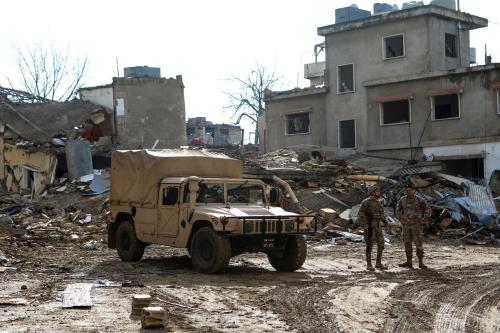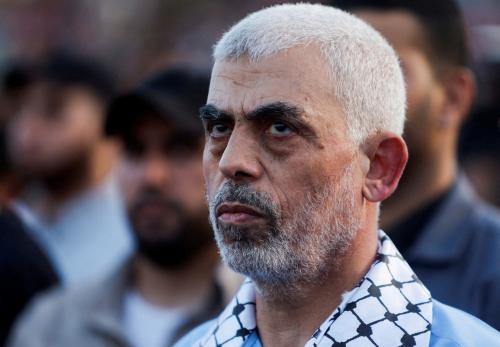Will McCants: The recent ISIS-claimed attacks in Paris, Beirut, and Egypt indicate the organization wants to take the fight to its enemies abroad. One reason might be that all is not well in ISIS-land. The nascent state in Syria and Iraq has lost around 25 percent of its territory and tens of thousands of fighters in the year since America and its allies began to their campaign to defeat it. While the state still endures for now, it’s under tremendous pressure because of the costs of ceaseless war.
To explain the troubles ISIS faces at home, we have invited a group of scholars to comment on its governance over the past years and speculate on what they might face in the year ahead. First is Mara Revkin, a J.D./Ph.D. student at Yale who studies governance and lawmaking by insurgent groups such as ISIS.
Mara Revkin: More than a year after Mosul fell to ISIS in June 2014, sources report that civilians there are becoming increasingly critical of ISIS rule. Iraqis have recently described life in Mosul as a “nightmare,” “intolerable,” and “a big prison.” Others say that they have “no future” and are living in “a society where it’s normal for children to watch their elders being murdered.”
These anecdotes do not prove conclusively that public opinion has shifted, but they suggest that local support for ISIS rule in Mosul may have eroded since last June, when some civilians cautiously welcomed improvements in security and essential services that followed ISIS’s takeover of the city. External observers may find it hard to believe that any civilian living in fear of death by decapitation or stoning could regard such a system as legitimate. Yet, Syrians and Iraqis whom I have interviewed say that attitudes toward ISIS governance are often more favorable than outsiders commonly assume, particularly in the early stages of ISIS rule.
External observers may find it hard to believe that any civilian living in fear of death by decapitation or stoning could regard such a system as legitimate.
What explains how opinions toward ISIS change over time? Attitudes toward ISIS do not necessarily reflect objective assessments of the quality of ISIS governance, but are largely determined by changing reference points with respect to what is considered “normal” in a war zone, as well as relative comparisons between ISIS and the available alternatives. Research in the field of behavioral economics suggests that preferences are “reference-dependent”—that is, people do not make decisions based solely on the desirability of the expected outcome, but on the contrast between that outcome and the baseline against which it is being compared. So, someone can rationally choose an objectively bad outcome if that outcome is less bad than the person’s ex ante situation.
Although these theories were designed with peacetime societies in mind, the conclusions are just as applicable to wartime environments of fragmented sovereignty,where civilians are faced with a choice between multiple armed actors who are all competing for their support. Applying this framework to current events in Iraq and Syria can help explain how public opinion toward ISIS changes over time, and why civilians may sometimes prefer ISIS to the available alternatives.
Early days
When ISIS takes over new territory, its first priority is restoring security and basic services (primarily water and electricity) as quickly as possible. In some areas, ISIS has even taken over bread factories to provide free or subsidized food. Syrians I have interviewed in Turkey say that ISIS police and courts initially try to build goodwill with the population by cracking down on ordinary crime—thieves, murderers, drug dealers, and rapists are the primary targets. Gradually, ISIS begins to regulate public morality and religious practices by deploying its propagandists and preachers to educate civilians about the requirements of Islam. While this proselytism is mere outreach and advice at first—civilians are politely encouraged to stop smoking and drinking—it later becomes coercive and violent with the introduction of corporal punishments for anyone caught selling or consuming cigarettes or alcohol. So while Mosul’s new rulers were taking steps to restore stability, they initially asked relatively little of civilians. Only later did ISIS begin to impose harsh Islamic punishments and demand tax payments in exchange for protection and services.
In the early days of ISIS control, civilians compared ISIS governance to what came immediately before it—which in the case of Mosul was a period of anti-Maliki unrest, protests, breakdowns in public services (such as the closure of the Mosul airport with no explanation), as well as widespread crime and violence. One civilian from Mosul suggested that ISIS rule was a relative improvement: “Do you know how it was in Mosul before ISIS came? We had bombings and assassinations almost everyday. Now we have security.”
Many Sunnis in Mosul, who feel marginalized by Iraq’s Shia-led government, reportedly welcomed ISIS as “liberators.” As one Sunni resident said, “ISIS with all its brutality is more honest and merciful than the Shia government in Baghdad and its militias.” Civilians who were unhappy with the Iraqi government would have been inclined to look favorably on ISIS’s initial efforts to provide free or subsidized services. In the case of Syria, civilians faced a repressive dictatorship. In both contexts, ISIS only needed to perform slightly better than the alternatives in order to be perceived as the lesser evil.
The initial neutral or positive views toward ISIS expressed by many in Mosul can also be explained by dramatic demographic changes. Prior to ISIS’s takeover, Mosul’s population was estimated at 1.7 million, but as many as 500,000 fled when ISIS captured the city. Some chose to stay behind to protect property or families, but others may have preferred to take their chances under ISIS rather than rely on the protection of a Shiite-led government that many Sunnis distrust and resent. The massive out-migration from Mosul has skewed public opinion in a pro-ISIS direction. Civilians with the most anti-ISIS views are more likely to have left, and those who stayed behind were at least initially willing to bet that life under ISIS would be preferable to the alternatives. As recently as June 2015, some even asserted that Mosul was experiencing a “golden era.”
The new normal
After an initial period of relative calm and stability under ISIS rule, civilians reset their reference points around the new status quo. As one resident of Mosul explained,in the early stages of ISIS rule: “Life is normal in Mosul. People of Mosul are more afraid of the future than of the present.” In effect, ISIS had become the new normal. This is no surprise—scientific research shows the remarkable ability of humans to adapt to different types of trauma, including natural disasters, paralysis, and high rates of crime and violence.
Through the process of normalization, events and ideas become taken for granted as natural. Studies of inner-city communities have found that chronic exposure to violence has a “numbing” effect that reduces its negative effects on psychological well-being. Over time, this adaptation seems to make people less anxious and depressed when exposed to high levels of violence. Theories of normalization can help explain why civilians living under ISIS rule seem to adapt relatively quickly to levels of fear, stress, and violence that might otherwise be intolerable.
In effect, ISIS had become the new normal.
But while the process of normalization is a coping mechanism that makes life more bearable—at least temporarily—for civilians living in conflict areas, it also comes at a high cost. Normalization desensitizes people to the damaging effects of violence and lowers the perceived costs of aggressive behavior. Research has demonstrated that over time, children exposed to high levels of violence become more willing to use violence themselves (psychologists call the process “pathologic adaptation”). Israeli and Palestinian high school students, for instance, are more likely to accept and justify violence than their European counterparts—this suggests that prolonged exposure to conflict may weaken social norms that usually restrain violent behavior. So while normalization may make life under ISIS rule more bearable in the short-run, its long-term consequences for society may be very damaging.
A turn for the worse
Interestingly, while public opinion may be turning against ISIS, it is not clear that the objective quality of services has declined substantially. So the story of changing attitudes toward ISIS is more complicated than it first appears. While civilians criticize ISIS’s heavy-handed rule, many admit that ISIS is governing more effectively than the Iraqi government did.
As one resident of Mosul said recently: “Everything is better under the Islamic State.” Another said: “I have not in 30 years seen Mosul this clean, its streets and markets this orderly. According to others, “There is no corruption in the society” and, “Services are satisfactory. We almost always have water and…we have [electricity] round the clock.”
If public opinion is in fact turning against ISIS, it is not necessarily because the quality of services has deteriorated. Rather, residents of Mosul are unhappy because the cost of those services—in terms of the taxes and fees that ISIS collects—has steadily increased over time. After initially providing some essential services for free, ISIS later began to impose heavy taxes and fees for water and electricity. Meanwhile, police were cracking down on violations of ISIS rules with corporal punishments and monetary fines.
As one resident of Mosul said recently, “Everything is better under the Islamic State.”
Adding to that is the heavy collateral damage caused by airstrikes on ISIS-controlled areas, which will only intensify as France and Russia retaliate for the recent attacks on their citizens. If ISIS begins to divert substantial resources away from governance in order to finance high-profile terrorist attacks and respond to the foreign interventions that such operations will likely provoke, civilians living under ISIS rule can expect their taxes and service fees to rise even more.
So although the overall quality of services provided by ISIS—including sanitation, utilities, security, and healthcare—may have remained relatively stable, from the perspective of civilians, life under ISIS rule is becoming more dangerous and costly over time. Civilians who normalized their reference points around ISIS’s relatively light-handed rule during the early days of control, when its first priority was to win the population’s trust and cooperation, now feel that ISIS is failing to live up to the expectations that it initially established.
Another factor in growing disillusionment may be the mismatch between civilians’ initial expectations for the longevity of ISIS rule (which many believed would be short-lived) and the harsh reality of its unanticipated persistence. As Stathis Kalyvas has observed, “individuals tend to underestimate the duration and fluidity of civil wars and hence overestimate their own security, especially in the war’s initial stages.”
When ISIS first captured Mosul more than a year ago, many civilians chose to take their chances with ISIS rather than flee. Some were afraid of what ISIS rule might bring, but nonetheless decided to stay because they believed—optimistically—that any hardship would be temporary and therefore bearable. They saw ISIS as a passing phenomenon that would quickly collapse under the weight of unsustainable ambitions.
But as the caliphate has proved itself to be more resilient and intractable than expected, wishful thinking has given way to the increasingly plausible scenario of long-term ISIS control and governance. What civilians may have been willing to tolerate for a few months is becoming increasingly unbearable as those months turn into years.
The Brookings Institution is committed to quality, independence, and impact.
We are supported by a diverse array of funders. In line with our values and policies, each Brookings publication represents the sole views of its author(s).



Commentary
Experts weigh in: Is ISIS good at governing?
November 20, 2015